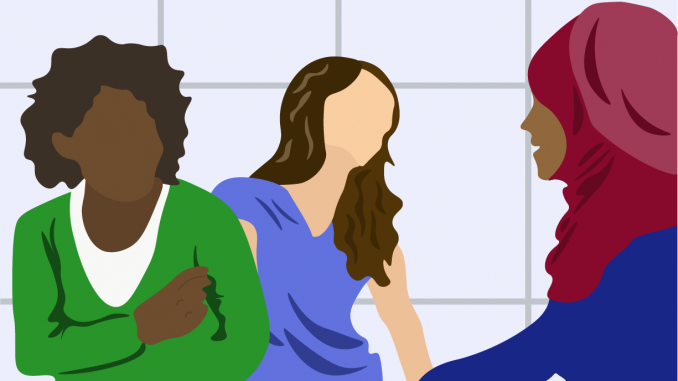
Kurat Abaidullah’s desire to provide spaces that empower and uplift other women comes from her faith.
“There’s this perception that in Islam, maybe women are not given the same rights as men, or women are kind of undermined, right?” said Abaidullah, a first-year biology graduate student and founder of the Ahmadiyya Muslim Student Association for Women. “Our community, the Ahmadiyya specifically, our sect, it makes sure and emphasizes the importance of women.”
Temple University students in women-led organizations are uplifting each other and others through student organizations and community service in order to create opportunities for future generations.
It is important that women today remember those who came before them and leave behind a legacy future generations can be proud of, Abaidullah said.
“We often find ourselves looking at the past and looking at our leaders but also how are we going to be looked back, how is our generation going to look back on us, what kind of movement are we making, what kind of strides are we making to help the next generation,” she added.
Brynna Haupt, a senior media studies and production major, took one such stride and co-founded the Sports Media Society for Women with two other students in 2019.
The Sports Media Society for Women aims to advocate for and support women in sports media by providing mentorship and networking opportunities, The Temple News reported.
The first meeting had around five to 10 attendees, but the organization now has more than 40 members, said Haupt, the organization’s current president.
“Just the exponential growth that we have seen is just super surreal and heartwarming,” she added.
Being part of the Sports Media Society for Women has empowered Hauput and introduced her to some of her best friends, she said.
“I couldn’t ask to be in a better position, just, you know, kind of leading this org and leading this mission, but also seeing the relationships bud and connect and develop and go a long way,” Hauput added.
For Arya Kurien, a senior accounting major and fundraising chair for Women in Finance, being in a women-led organization helped her become more confident and speak her mind when working with male classmates, she said.
“I feel like a lot of boys can just tend to like dominate and be like, ‘This is what we’re going to do and that’s it,’” Kurien said. “I feel like I’m a little bit more assertive in my opinion now.”
Sraavya Pinjala, a freshman biology major and secretary for Women in Medicine, felt she also had problems being taken seriously by her male classmates due to her gender.
“It’s so incredibly frustrating because you know, you’re like, ‘I’m right, you know, I don’t know why everyone has all these doubts about me,’” Pinjala said.
These organizations have also used community service as another way to empower themselves and others, Pinjala added.
Women in Medicine volunteers at the Chosen 300 Ministries soup kitchen on Fridays, preparing meals and serving food to patrons.
It’s important for Women in Medicine to be involved in community service because issues like poverty can impact both physical and mental health, Pinjala said.
Many people cannot afford to seek treatment for illnesses or other health problems due to the cost and delaying treatment makes the original problem worse, The Guardian reported.
“It’s really important for us to take care of our community, and if that means giving people a hot meal like once a week, you know, and not even just thrown at them like it’s delivered, it’s wrapped for them then, like, we’re going to do that,” Pinjala added.
Each member of the Sports Media Society for Women executive board chose a Black-owned business to raise money for during Black History Month. Haupt chose Harriett’s Bookshop, an independent bookstore on Girard Avenue near Marlborough Street.
“I wanted to highlight a Philadelphia business, especially local, that supports missions dear to my heart: women empowerment, Black women representation and raising awareness about social injustice,” Hauput wrote on Twitter. “Going to a public university in a predominantly Black city, I want to emphasize the importance of these issues and bring Iight to the situations and work that still needs to be done for real equality.”
In Philadelphia, Hispanic and Black people are more likely to be below the poverty line, with Hispanics at at 37.9 percent and Black people at 30.8 percent, according to a 2017 study by Pew Trusts.
The Ahmadiyya Muslim Student Association for Women regularly holds food drives at the Bait-ul-Aafiyat Mosque on Glennwood Avenue near 13th Street, and they hosted blood drives and took part in a community effort to plant trees in Lancaster County previously, Abaidullah said.
“It was amazing knowing that you are doing work that will directly impact the future of the environment,” she added. “As Muslim women, we are taught to treat creation with love and respect and make a heaven on Earth. Helping plant trees and working with people of different backgrounds, ages and creeds did just that.”



“There’s this perception that in Islam, maybe women are not given the same rights as men, or women are kind of undermined, right?”
Not a perception, a fact.